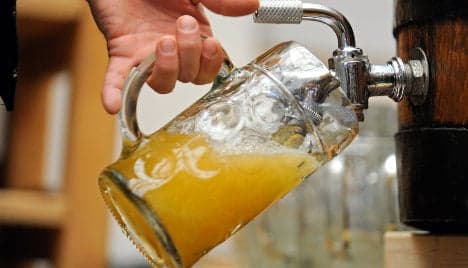Beer contaminated with plastic particles

German beer is famous for containing just four ingredients under the beer purity law, but it appears some brands have picked up an unwelcome fifth ingredient - plastic particles.
Research released on Tuesday and commissioned by broadcaster NDR's consumer rights magazine programme Markt, tested a range of Germany's biggest-selling brands of beer and mineral water, and found every single one contained microscopic plastic fibres.
The worst-affected beers were Pilsner from the northwestern Jever brewery, with an average of 78.8 particles per litre, followed by Munich's Paulaner wheat beer at 70 and Warsteiner Pils at 47.
Mineral water was much less contaminated. Of the products tested, Aldi's discount water contained the most plastic with an average of 7.3 particles per litre, while the supermarket's more upmarket Quellenbrunn brand - along with waters from competing shops Lidl and Penny - contained at least four particles per litre.
The study's lead researcher, Professor Gerd Liebezeit of lab analysis company MarChemConsult, said the contamination was not just in water and drinks.
"We have identified this synthetic material in a wide range of areas, not just in food and drink but also in the air," he said.
While no specific danger to human health has yet been associated with the particles, research suggests they could present risks in time.
"Micro-plastic will sooner or later represent a danger to us," Professor Stephan Pflugmacher, an ecological toxicologist from the Institute for Ecology at Berlin's Technical University, told Markt.
Pflugmacher's work investigated the effect of the plastic particles on mussels, and found that over time the fibres can accumulate into tissues, which in high concentrations can kill the creatures.
Both the federal environmental ministry and the ministry for nutrition have denied responsibility for dealing with the micro-plastic issue, as each claimed the problem fell under the other ministry's remit.
Meanwhile both the German Brewing Federation (DBB) and the producers of the mineral waters involved in the study have said they have launched their own investigations into the plastic content of their products.
Comments
See Also
Research released on Tuesday and commissioned by broadcaster NDR's consumer rights magazine programme Markt, tested a range of Germany's biggest-selling brands of beer and mineral water, and found every single one contained microscopic plastic fibres.
The worst-affected beers were Pilsner from the northwestern Jever brewery, with an average of 78.8 particles per litre, followed by Munich's Paulaner wheat beer at 70 and Warsteiner Pils at 47.
Mineral water was much less contaminated. Of the products tested, Aldi's discount water contained the most plastic with an average of 7.3 particles per litre, while the supermarket's more upmarket Quellenbrunn brand - along with waters from competing shops Lidl and Penny - contained at least four particles per litre.
The study's lead researcher, Professor Gerd Liebezeit of lab analysis company MarChemConsult, said the contamination was not just in water and drinks.
"We have identified this synthetic material in a wide range of areas, not just in food and drink but also in the air," he said.
While no specific danger to human health has yet been associated with the particles, research suggests they could present risks in time.
"Micro-plastic will sooner or later represent a danger to us," Professor Stephan Pflugmacher, an ecological toxicologist from the Institute for Ecology at Berlin's Technical University, told Markt.
Pflugmacher's work investigated the effect of the plastic particles on mussels, and found that over time the fibres can accumulate into tissues, which in high concentrations can kill the creatures.
Both the federal environmental ministry and the ministry for nutrition have denied responsibility for dealing with the micro-plastic issue, as each claimed the problem fell under the other ministry's remit.
Meanwhile both the German Brewing Federation (DBB) and the producers of the mineral waters involved in the study have said they have launched their own investigations into the plastic content of their products.
Join the conversation in our comments section below. Share your own views and experience and if you have a question or suggestion for our journalists then email us at [email protected].
Please keep comments civil, constructive and on topic – and make sure to read our terms of use before getting involved.
Please log in here to leave a comment.